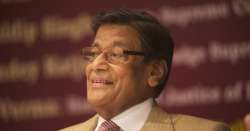AG on electoral bonds: Don't let transparency kill the scheme
"Do not let transparency kill the electoral bond scheme," said K.K. Venugopal. The government is in favour of maintaining the anonymity of purchaser and the redeemer of electoral bonds.

The Attorney General on Thursday told the Supreme Court that historically only black money was used in Indian elections and anonymity associated with electoral bonds is vital as voters need not know the source of funds for political parties.
"Do not let transparency kill the electoral bond scheme," said K.K. Venugopal. The government is in favour of maintaining the anonymity of purchaser and the redeemer of electoral bonds.
Venugopal said that stringent safeguards were already in place in the KYC verification guidelines of the purchaser of electoral bonds.
The bench headed by Chief Justice Ranjan Gogoi said: "Voters should know which party is funded by whom... And in terms of purchaser of bonds you can't go beyond the source who actually bought it."
The bench observation came on the fact that shell companies were often used as a garb to fund political parties.
The bench also queried the Attorney General on how the government had kept in loop the Income Tax department on the purchase of electoral bonds, as the one who purchases them would have to declare it under IT return.
The Attorney General could not respond to this query.
The bench also observed that the Election Commission does not know anything about the identity of either purchasers or the one who encashes the bonds.
Venugopal said that the scheme of electoral bonds was an experiment to curb the flow of black money in elections and that the court should not interfere at least until the end of the Lok Sabha elections.
The Bench, however, proceeded to query Venugopal on how electoral bonds would help curb black money.
The Chief Justice said: "We want to know when the bank issues an electoral bond on application, does it have all details against whom the bond has been issued."
The Attorney General said no. The CJI, in a sharp reply, said that then the entire exercise to combat black money becomes irrelevant.
The bench also observed that how would the government identify money used to purchase the electoral bonds is black or white?
Justice C.S. Khanna, who was part of the bench, said that black money can be made white by routing through multiple shell companies and although KYC has been secured, it would not help in combating the flow of black money.
The Attorney General said the shell companies will continue to exist and that electoral bonds can't take care of them. Therefore, he told the court not to interfere with the ongoing experiment with electoral bonds.
Prashant Bhushan has sought the court's order for a stay on electoral bonds as the ruling party had already bonds in excess of nearly Rs 30,000 crore. He has moved the Supreme Court against the anonymity of electoral bonds.
The court then heard a brief rejoinder and submissions by the petitioners before reserving its order. The court will pronounce an order on electoral bonds on Friday.